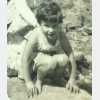| Profile | Posted by | Options | Post Date |

|
Marie
|
Report
|
7 May 2014 04:17 |
|
As others have stated this book was very difficult to absorb in the beginning. I'm sure the research put into this before writing made the author so familiar with the theatre world but for someone without that it was overdone. I did keep on though and I'm glad I did. The story of Nelly kept one intrigued. The history was wonderfully put from different perspectives. A lot of thinking was inspired by this story.
|

|
Joan
|
Report
|
16 Apr 2014 05:22 |
|
The Invisible Woman
Well, once I could struggle past the first 2 chapters it turned out to be a very informative book. That does not mean to say that I could ever give it the 'interesting' label. Just too much boring description. Every other actress at that time seemed to be either a Fanny or a Nellie, which was totally confusing to me.
However, the effort to persevere with it was worth it as there was a huge amount of research and detail. If it could have just been written more as a novel with a touch of humanity in it I would have found it much more acceptable.
A word on the binding of the book. My copy had been badly guillotined and the cover has curled irrevocably outwards. And the font was too small for an oldie. Certainly not the fault of Ms Claire Tomalin
Joan
|

|
Winifred
|
Report
|
12 Mar 2014 15:53 |
|
I have received this book but I haven't finished it yet. Life has got in the way recently but I am a good way through it so should be finished sometime next week......fingers crossed. I am thoroughly enjoying it. Maybe it's my interest in the theatre that has got me hooked. It's a great piece of social history.
|

|
AnninGlos
|
Report
|
11 Mar 2014 20:15 |
|
Review the Invisible Woman
The first couple of chapters, full of information about the actresses in the 19th century, their lives and how they were generally regarded as having low morals and assumed to be prostitutes, were interesting. However they were also involved and complicated and might well serve to put some people off continuing to read the remainder of the book. On the other hand, many people with an interest in genealogy, with ancestors in the theatre world,would find these chapters could be a mine of useful information. Reading about the reputation of actresses in those times it is hard to imagine that by the 20th century they would be revered as celebrities.
The book revealed the complex character of Dickens, on the one hand upholding high morals publicly while not leading a high moral life himself, in fact he could be considered a hypocrite. And the same could be said of his contemporaries such as Wilkie Collins.
The book was very well researched with a lot of in depth information both about Dickens and Nelly Ternan. After the first two chapters I found it easy to read and felt it would make a good English Literature text book for schools.
This type of book has the potential to become a list of people and events. Tomalin avoids this by weaving the story in an enticing and interesting way. Those who give up in the first chapters miss a good story. One plus for me was finding that the sisters are buried in the Highland Road cemetery which is where two of my Great Grandfathers are buried. A compelling read.
|

|
Sally
|
Report
|
8 Mar 2014 18:13 |
|
The book was definitely not my normal reading! I read the first two chapters and so wanted to put it down, but decided to open my mind and persevere. I am really glad that I did, it was actually interesting to get a feel of Dickens the person, he does not seem to be a nice individual .It was most interesting to get a feel of that time and the people he had around him. I will be intrigued as to how it adapts to the big screen. I have suggested that my daughter now reads it, she is struggling with the beginning as well, but have told her that it is really worth continuing with it !! It does seem incredible that an affair of this kind could have been hidden so well. The book appears to have been very well researched.
|

|
SuffolkVera
|
Report
|
5 Mar 2014 16:32 |
|
Unlike some of the other reviewers I enjoyed the first chapters with the theatrical information. I did already know a bit about theatre at this time as my 3 x great grandfather was on the stage from the 1820s till his death in 1845. He appeared at many of the same theatres as the Ternans and might well have known Nelly’s mother.
The book is fascinating as the story of the relationship between a woman who is low down the social scale and a famous and well respected man but, because so much of the evidence has been destroyed, it is impossible to know what lies behind the story and a lot of assumptions are made. To be fair to the author, Claire Tomalin, she does normally say when a particular section of the book is speculative.
It’s difficult to understand today how their relationship could have been kept such a secret from all but Nelly’s immediate family and one or two people close to Dickens. I suppose at Dickens’ social level the man was the master and didn’t have to explain his comings and goings to his family and, of course, there was no mass communication. I would have thought there were more rumours flying around than appear in the book but, without the evidence of letters etc., we can’t really know this either.
I think Nelly may have felt very isolated and lonely. She, and her sisters, come over as strong, capable and intelligent women. Though they were to a large degree self-educated they all seem to have become well-read and good linguists. From the way the book is written it appears that Nelly probably had a genuine love for Dickens but it is possible that she was using him as a means of gaining security and a better life. She was certainly clever enough to hide her previous life and make a new one after Dickens died.
To try to partly answer some of the questions raised in this thread:
I’m not a lover of Dickens’ novels but I think it is possible to separate Dickens the man from Dickens the author. I don’t think his portrayal in this book will change my reading of his novels at all.
Any author must be influenced by the people he knows but I doubt if any of Dickens’ characters are deliberately based on those close to him. His female characters, for instance, are probably amalgams of women he has known and, as such, some of them will share some of Nelly’s characteristics.
I think anyone reading the book must have enormous sympathy for Dickens’ wife Catherine. He appears to have treated her abominably but I would like to know more about her before passing any judgement. Is there any evidence that she had even a mild mental illness? This would have been quite a stigma for a well known man. Removing her children from her appears to be nothing more than vindictive but was there more to it than that? I really would like to learn more about Catherine.
Nelly’s husband came over as a rather negative character right from the start. The discovery of Nelly’s affair may have been the final straw but I think he may already have been depressed. He doesn’t seem to have really found a career path that he was happy with and they had financial problems.
As to what the modern world would say if such a story came to light today, I think the answer is in Claire Tomalin’s own comment “Morality changes with the times”. (I don’t have the book to hand so may not have quoted the exact words.)
I would be interested to see the film. I think it is likely that the speculative parts of the book will be included and come over as “truth” and I can’t imagine what the happy ending is.
I apologise for having made this review so long but, to conclude, I thought this book was well researched and well written and I found it an enjoyable read.
|

|
GenesBookClub 
|
Report
|
5 Mar 2014 15:19 |
|
Some very detailed reviews. Thank you for taking the time to post your thoughts on the Invisible Woman, Penguin/The Book Club very much appreciate the feedback.
If you haven't already and would like to, please contact us for your chance to receive the March title, Split Milk by Amanda Hodgkinson.
http://www.genesreunited.co.uk/boards/board/hobbies_crafts/thread/1337922
The Book Club
|

|
AngieP
|
Report
|
2 Mar 2014 17:55 |
|
I too found chapter one hard to get into, trying to keep track of all the people mentioned and their relationships.
Chapter two is easier and I am looking forward to getting further into the book. I am wondering how the film can capture all the information given in the book. It was nice to see another side to Dickens, and you can now see where he gets inspriation for his writing.
When I have finished the book I will post further reports.
|

|
Lesley
|
Report
|
2 Mar 2014 17:20 |
|
The Invisible Woman – Claire Tomalin
Travelling by underground train in London, one can large bill posters advertising the “major motion picture” The Invisible Woman at every station. “That is the book you are reading,” said my husband as we entered yet another station and see yet another advertisement. It is clever to use the same picture for the book cover and the film. See the film – buy the book; but in this case was this the right move? Can the film be totally loyal to this book? Will the book be what the reader expects?
“Part social history, part detective story...” John Carey is quoted on the cover. Certainly the first part of the book gives an extremely detailed thesis on the acting profession in Georgian and Victorian times and of the successful women who appeared on the stage. If I had seen the film and then bought the book to read on the beach this summer, I might have been sorely disappointed by the first chapters which are pure social history. This is an extremely well researched paper on actresses and their successes in their chosen profession whilst raising children, with or without a husband, whilst being mistresses and yet continuing to earn a good wage and retain their public’s adoration. There were so many names considered in this part that I became quite confused about whom I was supposed to be reading. Having proved at great length the ability of women to succeed as actresses whilst having a relationship with a man who was not their husband, then it is surprising that the author does not question the reasons why Mrs Ternan and her three daughters felt the need to be quite so secretive about their association with Charles Dickens. Dickens seemed to have had a hand in the marriages of Nellie’s sisters who achieved better partners than would otherwise have been expected. Maybe they had financial and security reasons for remaining silent. Why was Dickens so coy about his relationship with an actress? According to Claire Tomalin many of Dickens’ peers, the famous and even royalty enjoyed extra marital relationships, with the resulting offspring, without the degree of secrecy employed by Charles Dickens. Was he ashamed that Nellie had been an actress? Did the Ternan women stay quiet because they believed that becoming a professional actress was not what ladies did?
In Part 2 Nellie Ternan, her mother and two sisters and Charles Dickens become the focus of the book. Possibly because Nellie kept such a low profile throughout her life, a good number of pages are devoted to the other Ternan ladies and their life rather than concentrating on Nellie. Prior to reading this book I knew little about Dickens, save that learnt from a TV programme Sue Perkins presented some time ago. I had seen parts of a few Dickens books, dramatised and shown on TV (and taken the opportunity of inventing tasks which required my immediate attention elsewhere to relieve my boredom of the programme/series – I am not a great fan I am afraid). The Perkins’ programme and this book’s revelations surprised me. Dickens is portrayed as a self-centred dandy, one who was as fond of himself and his own self image as he was of anyone else. I believe that he was a selfish person. I wonder if by cementing a relationship with Nellie, someone the age of his daughter, then Dickens was hoping for eternal youth.
I know that Dickens was prominent in many good works and charities concerned with the lower classes, but I wonder how much this was for his own research for another book or to promote his own self image and to convince himself that he had risen above this level of society? To the very end of his life Dickens seemed to feel the need to serve his public, and his own ego. If Claire Tomalin is correct, it seems that his books draw on his own experiences and those people he knew in all aspects of his life. But then isn’t this true of most authors?
It would have been interesting to have learned more about Dickens’ second invisible woman; his wife Catherine. We do not know what Dickens’ relationship with his wife was like before he abandoned her. Certainly they had many children, but did they ever love each other? Could this have been one of those convenient or arranged Victorian marriages and one which had been entered into to improve his social status? She seems to have been abandoned totally and cruelly, and yet remained silent about her ill treatment. Why? How was she silenced? Did Dickens’ have more than a sister in law relationship with Georgina? Or was she conforming to the older Victorian spinster type; one who had been handed a convenient and comfortable role and was therefore counting herself lucky? Her loyalty to him appears total during his life and after death. Why did Dickens’ son, who had seen his father with his mistress, not share with his brothers and sisters the feelings of disgust he felt for his father? Were they not surprised that their brother has remained loyal to their mother?
Having read this book, which I did enjoy once I had read further than part 1, I would enjoy reading other books about Dickens so that I have more evidence with which I could form my own opinion about him and his relationships with the women in his life. Claire Tomalin makes suggestions about the course of Nellie’s life and infers her attitudes and reasons behind various actions, but these are often conjectures. A good book should stimulate thought and discussion. This one has certainly done that. Thank you!
Lesley :-)
|

|
Whizz
|
Report
|
2 Mar 2014 12:51 |
|
Having been a fan of Dickens' novels from a young age I was interested to read this book. I had an awareness of his possible affair with a younger woman but had never felt compelled to seek out the details. I found this book well written and well researched.
Being an exceptionally talented novelist put him in a different league from most Victorian men but falling in love with a younger woman probably did not!! Of course then as now a figure in the public eye goes to great lengths to keep certain aspects of their private lives out of the public domain and Dickens seems to have managed better than most. But I wonder how he and nell would have fared to day with the media, the paparazzi and social networking?
None of this affects my appreciation of Dickens work. What he does in his private life may impact on his writing in as much as any writer draws from their own lives but does it truly affect the reader?
I haven't seen the film but in general I believe that the truth as far as it's known should be adhered however in reality that does not always happen as it doesn't always make for good cinema.
Many of Dickens characters are caricatures of a personality type but I have always been led to believe that they have foundations in people that Dickens actually knew, for example Mr. Micawber is based on Dickens' own father.
Of course I feel some sympathy for Catherine Dickens based on the barde facts but I'm sure there must be more to it. We don't get to hear her side at all. But I found it strange that only one of her children chose to 'take her side'.
Since the affair with Dickens was prior to Nelly even meeting her future husband I doubt that it led to his depression, rather financial problems would have been more to blame.
And if this happened today? It would be blown out of all proportion in the press, the social media would go crazy for a few days and it would all die down as it does any way when anyone in the public eye demonstrates some ill advised behaviour. It is often supposed that Victorian morality is far removed from todays but is it really?
I enjoyed the book, I'm glad I read it. I learnt a great deal about Victorian theatrical life. it is an interesting social history book as well as a biography of Dickens and Nelly and I thank Genes Reunited for giving me the opportunity.
|

|
+++DetEcTive+++
|
Report
|
1 Mar 2014 12:00 |
|
Where to start?
This book reflects Victorian society where Actresses are seen as undesirables not fit to mix with the wives and daughters of their male admirers, or to be acknowledged by them.
The first section of the book follows the stage career of Ellen (Nelly) Tenant and her family. As travelling players it was a hard life with many ups and downs. Today we are used to the idea of actors being employed to perform in one Play at a time; the travelling players constantly had to learn new lines and perform in different productions on the same night. It was interesting to learn that many productions were put on as Benefits to supplement their income. The names of many historically well known acting families were dropped into the text.
Despite my assumption that Actresses were no better than call-girls, Mrs Tenant seems to do her best to protect her girls’ virtue. Without surviving documentation, one wonders if she encouraged Nelly to accept Charles Dicken’s overtures as a meal ticket, or whether Nelly really was in love with him and saw being his mistress as the only way to be together. Despite the hint that Nelly may have born a child which subsequently died, some of CD’s letters suggest that Nelly wasn’t as willing for a physical union as he might have hoped. May be she hoped that by holding out she still had the chance to marry respectfully?
To address some of the questions posed by the Book club.
- Although I have read several of Dicken’s novels while at school and as an adult I can’t remember the female characterisations in great depth. The impression left is that they were either comic or insipid virtuous young gels, or strong women who placed the wished of those they cared for above themselves. Ellen comes across as a mixture of the latter 2, with the possibility that Mrs Tennant could be cast as the first.
- A while ago there was a TV programme about CD and Catherine. At the time I found it strange that Catherine’s sister Georgina Hogarth would remain in the family home as a housekeeper & to care for the children rather than to move with her sister. There was the personal suspicion that CD had transferred his affections to her. Although it was the norm that children of married couples ‘belonged’ to the father, but to order his children not to have any contact with their mother was heartless. One could say that he was trying to be ‘true’ to Nelly by not having matrimonial relationships with his wife. Poor thing – she’d been cast off for a younger version. How many times has this scenario been repeated? You only have to look at the 20th Century divorces to see that it is not at all uncommon.
- Unless I missed something, I’m not entirely sure that George’s breakdown was caused by learning of Nelly’s affair. Nelly had produced and acted in charitable production at the turn of the year. Might her Player background have finally been publically revealed? However, the fact that it came almost immediately after he gave a ‘charitable reading’ suggests that any rumours circulating about an affair may finally have hit home.
More telling is the reaction of their son Geoffrey when he discovers evidence in personal papers after Nelly’s death. Even though this occurred in 1914, (CD died 1870) he was desperate to protect his mother’s reputation and by association that of CD.
- If similar details should emerge about a living Literary Giant, reaction would probably be polarised. On the one hand would be people who say ‘So what?’ on the other hand the author would be accused of being two faced – preaching womanly virtue while keeping a Mistress. One does wonder if the lengths taken to protect her reputation were intended to protect own.
Although I’ve no intention of watching the film, I’d be annoyed at the reported happy ending. Even though there it is rarely possible to dramatise all events from a book, the basic plot should be adhered to.
Did the book have a happy ending? In my opinion, no. CD was frustrated at not being able to live openly with Nelly. Nelly changed her history to wipe out all references to CD and her theatrical upbringing, possibly lying by omission to her husband. Her son destroyed all surviving papers to protect her reputation and refused to comment when questions were raised. Catherine was separated from CD at his insistence, with slurs made about her character.
……………
Gone on a bit, eh??? :-D
|

|
+++DetEcTive+++
|
Report
|
27 Feb 2014 18:37 |
|
Up to the section post CD's death. The small font of the book does mean that its too difficult to read in the evening or when tired. As I'd normally avoid auto/biographies it needs more concentration than my preferred genre.
As an initial comment, I do feel that there are a lot of suppositions being made by the author.
|

|
Linda
|
Report
|
27 Feb 2014 16:12 |
|
I was really looking forward to reading this book. Unfortunately I have found reading the first couple of chapters really hard to get into as I it didn't seem to flow. Hense, I abandoned the book.
Having read the comments by Teresa I will give it another try. :-S
|

|
GenesBookClub 
|
Report
|
24 Feb 2014 16:30 |
|
Thanks Teresa. The team haven't seen the film yet either but yes, it will be interesting to see how the book compares.
|

|
TeresainWirral
|
Report
|
23 Feb 2014 12:57 |
|
I found chapter one really difficult to 'get into' and nearly gave up on the book, chapter 2 was still a bit of a struggle but from chapter 3 I was engrossed in the story of Nelly. It will be interesting to see how the film portrays the story, there is an awful lot of background information that you get from the book that can't possibly be shown in the film.
|

|
GenesBookClub 
|
Report
|
10 Feb 2014 10:08 |
|
Hi everyone,
Congratulations to everyone selected to receive a free copy of The Invisible Woman. We hope you enjoy reading it, and we'd love to hear what you think of the book!
Here are some questions to think about as you are reading the Invisible Woman:
1. How would Dickens’ portrayal in The Invisible Woman change your reading of his novels?
2. In a film adaptation of the book, how important do you think it would be to stick strictly to the facts of the story? Would you allow any room for fictionalisation?
3. Do you see parallels between any of the people in Dickens’ life and the characters in his novels?
4. To what extent do you feel sympathy for Dickens’ wife, Catherine?
5. Do you believe that Nelly’s husband’s depression stemmed from discovering Nelly’s affair?
6. What do you think the public reaction would be like now if a similar story emerged about a modern writer?
The film version is due for release on 21 February 2014, watch the trailer here http://www.youtube.com/watch?feature=player_embedded&v=WDMHb3GetIc
|




